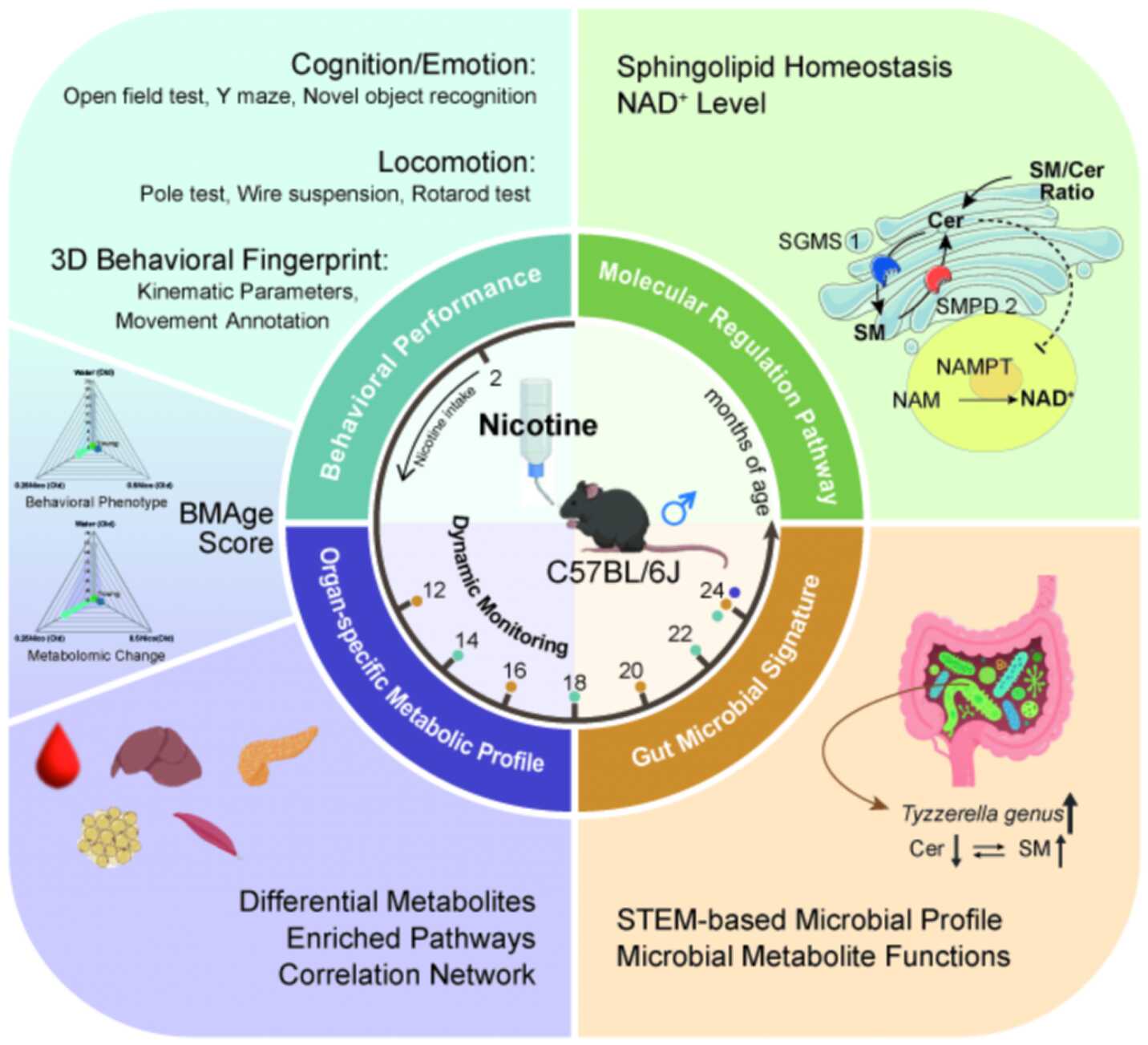
First Evidence that Lifelong Oral Nicotine Shapes Motor and Metabolic Aging in Mice
As global populations age, preserving mobility and metabolic resilience has become a central challenge for healthy aging. Aging is a systemic process marked by energy imbalance and organ‑specific metabolic decline, with motor deterioration emerging as a key component of frailty.
Nicotine—the principal bioactive compound in tobacco—presents a paradox: smoking accelerates metabolic and cardiovascular disease, yet epidemiological studies suggest lower risks of certain neurodegenerative disorders such as Parkinson's disease among smokers. Whether nicotine itself can influence aging trajectories has remained unclear.
Recently, a research team led by Prof. LIU Xin‑An and Prof. CHEN Zuxin at the Shenzhen Institutes of Advanced Technology of the Chinese Academy of Sciences, along with collaborators, for the first time, systematically demonstrated that lifelong oral nicotine administration reprograms aging-related systemic metabolism via the sphingolipid–energy metabolic axis and attenuates age-associated motor decline in mice.
The study was published in Advanced Science on July 28.
In this study, researchers conducted a 22‑month longitudinal experiment to examine the effects of life‑long oral nicotine exposure in mice. Animals consumed moderate or high doses of highly purified nicotine in drinking water, mimicking plasma concentrations in moderate to heavy human smokers but without combustion byproducts. Researchers combined high‑precision 3D behavioral tracking, multi‑organ metabolomics, gut microbiota sequencing, and cell‑based assays to map nicotine's systemic effects on aging.
The researchers discovered that nicotine reprograms aging‑associated metabolism in a dose‑dependent manner, particularly through glycolipid and sphingolipid pathways. These changes enhanced nicotinamide adenine dinucleotide availability, limited ceramide accumulation, and improved energy homeostasis—molecular adaptations that correlated with delayed motor decline.
Longitudinal gut microbiota analysis revealed preserved microbial diversity and the enrichment of sphingolipid‑related metabolites linked to sarcopenia prevention. By integrating behavioral and metabolic profiles, the researchers developed a "Behavior‑Metabolome Age" score, confirming that nicotine‑treated mice displayed a biologically younger phenotype.
This work provides the first systemic mapping of nicotine‑driven metabolic remodeling during natural aging and identifies a gut–sphingolipid–energy axis underlying motor function resilience. The study delivers three key advances: a life‑long, dose‑dependent assessment of nicotine's systemic impact; integration of AI-based 3D behavioral and multi‑omics data to quantify biological aging; and mechanistic insight into sphingolipid‑mediated neuromuscular protection.
The authors note that while oral nicotine in this controlled paradigm avoids combustion‑related toxicants and may pose lower systemic risks than conventional tobacco products, its long‑term safety and complex biological effects warrant careful evaluation. Further, the findings offer a mechanistic framework for evaluating long‑term nicotine exposure and inspire the future development of "non‑addictive cholinergic metabolic modulators" aimed at sustaining mobility and metabolic health in aging populations.
Building on years of expertise in metabolism, neurobiology, and inhalable materials, the research team will continue systematic, forward‑looking research to uncover the scientific basis and potential value of nicotine and novel aerosolized compounds in aging intervention and metabolic health.

Summary diagram of the study (Image by SIAT)
File Download:
